Update from the Graduate Coordinator, Luis Álvarez-Castro
The Spanish Graduate Program, comprised of close to forty students hailing from over a dozen countries, is a vital component of the Department of Spanish and Portuguese Studies. Our graduate students train in the study of Hispanic linguistics, literature, and culture from several approaches in the humanities and the social sciences, leading to MA and PhD degrees in either Spanish and Spanish American Literature and Culture, or Hispanic Linguistics. Moreover, our graduate teaching associates provide instruction to hundreds of UF students, which affords them an invaluable pedagogical experience that they will later apply in their careers. In sum, our graduate students represent the future generation of scholars and professionals in the field of Hispanic studies, while at the same time they greatly contribute to the present mission of both the Department and the University.
In August of 2015, we welcomed five new students into the program. We wish them the best of luck in their academic and professional endeavors at UF: Philip Allen (PhD, Literature), Nofiya Denbaum (MA, Linguistics), Laura Formariz-Díaz (PhD, Linguistics), Hamideh Mohammedi (PhD, Linguistics), and Sonia San Juan (MA Literature).
Furthermore, our graduate students continued to produce outstanding work as scholars and instructors during the academic year 2014-2015. We are happy to share their many accomplishments with you:
Students awarded MA degrees
- Adrienne Fama, Linguistics
- Whitney Koonce, Linguistics
- Brandon Shufelt, Linguistics
Students awarded PhD degrees
- Claudia Costagliola, Linguistics
- Martha Osorio-Cediel, Linguistics
- Giovanna Rivero, Linguistics
- Antonio Sajid-López, Linguistics
Outstanding Graduate Students of the Year
Each spring, the faculty elect those students whom we deem to be outstanding. In 2015, the awardees were:
- Adrienne Fama, Hispanic Linguistics, M.A.
- Sandra Moragues, Spanish & Spanish American Literature, M.A.
- Claudia Costagliola, Spanish & Spanish American Literature, Ph.D.
Study Abroad Instructors
Each summer, graduate students are chosen to teach and
assist with study abroad programs. In Summer 2015, these students were:
- Francesc Morales García, UF in Barcelona
- Marcela Murillo, UF in Valencia
- Alma Rodríguez, UF in the Dominican Republic
- Keegan Storrs, ISA Internship in Salamanca
Research Awards
Several of our graduate students received grants and awards to help their dissertation research.
- SPS Doctoral Summer Research Awards: Antonio Cardentey, Dámaris Mayans-Ramón.
- University of Miami Cuban Heritage Collection Graduate Research Fellowship: Antonio Cardentey
- Latin American Studies/Tropical Conservation and Development Field Research Award: David Vásquez
- Center for Latin American Studies Travel/Research Grant: David Vásquez
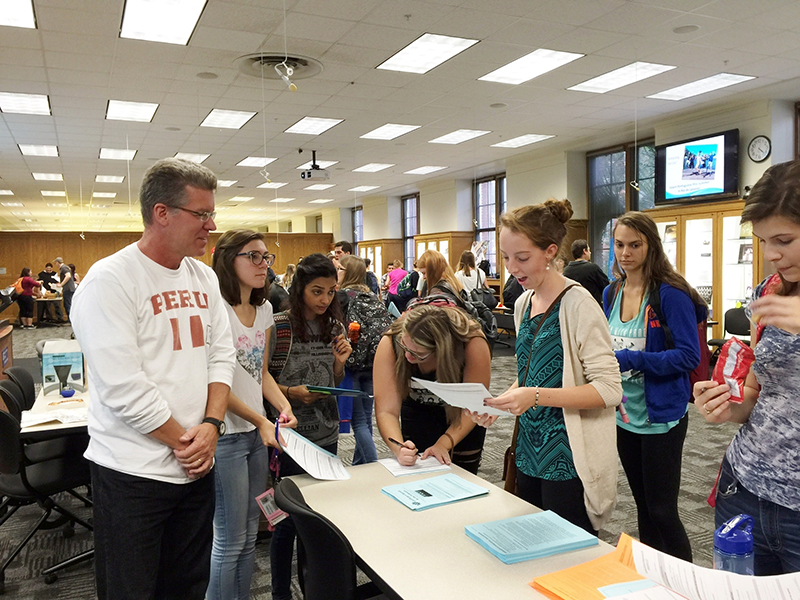
From the Undergraduate Advisor in Spanish, Dr. Greg Moreland
Universities throughout the United States are dealing with the challenge of declining foreign language enrollments, and unfortunately here at UF we too are experiencing this trend. I am pleased to report, however, that we have developed strategies to address this trend. We continue to build on current strengths, create new courses, and develop innovative programs. For example, the Certificate in Spanish for the Professions, in existence for just one full year, already has an enrollment of 25+. This confirms that our students are highly interested in the courses that constitute the Certificate, and in linking their study of language with the careers beyond the university.
“We continue to build on current strengths, create new courses, and develop innovative programs.”
Our Foreign Languages across the Curriculum (FLAC) program, which we initiated in 1996, continues to offer interesting and useful learning opportunities. The Fall 2015 line-up featured “Latin American Family & Customs” (Marcela Murillo), “Brazilian Cultural Exchange” (Patricia Infantino), and “University Life in Latin America” (Greg Moreland). Spring 2016 includes a repeat of the “University Life…” course, accompanied by “Terrorism in Spain” (Francesc Morales) and “Race in Brazil” (Andrea Ferreira).
SPS also held its third annual “Major Event” last fall. More than 200 undergraduate students came to gather information on our degree programs, our numerous study abroad programs, and our honors societies. We incorporated a more interactive element this year, which facilitated an even greater level of contact between students and faculty. We feel that this type of outside-the-classroom activity inspires a stronger sense of departmental (comm)unity and spurs further interest in the study of language and culture.
Current Students
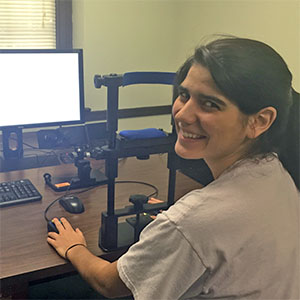
Osmer Balam has an article in press entitled “Semantic categories and gender assignment in contact Spanish: Type of code-switching and its relevance to linguistic outcomes” in the Journal of Language Contact. Along with Prof. Usha Lakshmanan and Prof. Tej Bhatia, he is also co-editing a special issue on the theme “Mixed Verbs and Linguistic Creativity in Bi/Multilingual Communities” for the Open Access Journal Languages.
PhD student Falcon Restrepo-Ramos, under the guidance of Assistant Professor Dr. Valdés-Kroff, is investigating the effect of Spanish diminutives in the gender processing of Spanish non-canonical ending nouns (i.e. nouns ending in –e or a consonant: cohete/corazón) in non-adjacent conditions, or sentences where the adjective carrying the gender marking is separated from the agreeing noun. The new state-of-the-art eye tracker in Dr. Valdés-Kroff’s lab has made this kind of study possible, and promising preliminary results in L2 learners and heritage speakers have been found. A second phase of this study would allow us to expand what we know so far about how gender affixation can facilitate the gender recognition and learnability of this difficult type of nouns in our L2 learners of Spanish.
Moreover, studies like this have increased the research interests of our fellow students to carry out similar exciting new experiments with this empirical technique.
In October 2015 Francesc Morales presented his work on Spanish zombie films and their relation with Spanish society, at the Puerto Rico Horror Film Fest. His paper is published as a chapter in the book Terra Zombie, an anthology published by Isla Negra with essays about the living dead phenomena in the Hispanic world.. He also wrote some of the entries for the August 2016 publication Great Events in Religion: An Encyclopedia of Pivotal Events in Religious History (“The Spanish Inquisition,” “The Albigensian Crusade,” and “The Peace of Westphalia,” among others ), edited by Florin Curta and Andrew Holt, and published by ABC-CLIO.
Andrea Villa
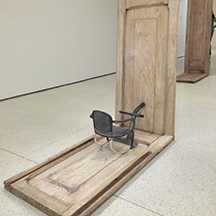
“As part of my dissertation research, which attempts to elucidate if one can speak of a feminine Neo-Baroque aesthetic in the literature and visual arts in Latin America, I have explored the artwork by Doris Salcedo (1958) a Colombian sculptor whose work is characterized by a constant tension, a lack of unity in traditional terms, as well as the combination of organic materials and textures in order to form dysfunctional objects.
“With the support of the Spanish and Portuguese Studies and the College of Arts and Sciences travel awards I had the invaluable opportunity to attend her Retrospective Exhibition this past September held at the Guggenheim Museum in New York. Given that the diverse sculptures and installations carry within them an unrequited testimony impregnated all throughout, the veiled metaphors come to light through the juxtaposition of textures, organic elements such as human hair and bones, as well as meanings and forms. In other words, Salcedo’s work provides an unspoken truth made tangible and visible for the viewer to decipher while coming in contact with the artistic site or object. When I encountered each of the art pieces at the Guggenheim I felt as I was looking at Salcedo´s artwork for the first time. Her pieces evoke an ambiguous resilience that combines with a confusing and distorted appearance of the art piece itself; which in turn translates into a type of sublime, silenced encounter between the audience and the absent body, yet at the same time omnipresent in each of her sculptures.”
Awardees
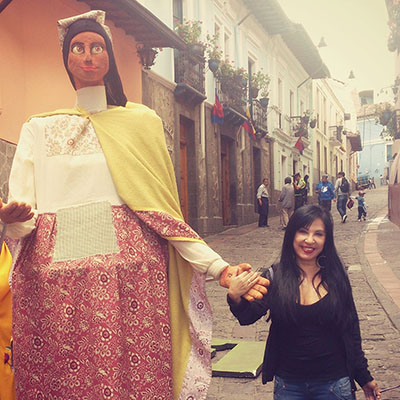
Giovanna Rivero
Giovanna Rivero PhD’15, SPS doctoral graduate and Bolivian author was the 2015 recipient of the Cosecha Eñe competition. She describes the experience here:
“This past November was one of the most exciting months in my literary career. An unexpected e-mail sent by the prestigious international short story competition “Cosecha Eñe 2015” revealed to me that my story ‘Albúmina’ had won the prize out of 4,000 short stories from 40 different countries.
“The protagonists of Albúmina” are two astronauts that can no longer identify Earth as their home. The migratory ambition of these two characters brought me to Madrid to receive the prize. Late autumn still exhaled a gentle breath which allowed me to walk the city’s streets and think of the different literary commitments I have been assuming since youth.
In any case, the expansive ambition of my astronauts had taken me, a week before my trip to Spain, to the International Book Fair in Quito, Ecuador. After a long time, I felt like I was carried back to the planet of my infancy. In Ecuador, while the great Chilean poet Raúl Zurita confirmed that poetry is one of the last symbolic refuges of a pillaged humanity, I found out that a black night was hovering over Paris. I also learned that Zurita was right and that to the radically materialist logic of the world it is necessary to resist with fiction, with literature, with the subversive power of the imagination.”
Alberto Escudero
Alberto Escudero (ABD) was the winner of the VI Concurso de Relatos 21 de Marzo with a prize of 3500 euros, for his short story titled “Cartas a Julio César (antología).” The event was sponsored by the city council of Tres Cantos (Madrid). This year there were more than 400 entries from all over the world. The jury was made up of Luis Mateo Díez and José María Merino, both members of the Real Academia Española de la Lengua, along with Milagros Frías and Luis Alberto de Cuenca.
“Cartas a Julio César (antología)” is a store told through the letters written by a retiree to the director of a local newspaper (hence the name Julio César in the title), in the hopes of getting the city to fix a stop light on a street corner he crosses daily. Because the director pays little attention to his pleas, the retiree gradually changes the obliging and servile tone of his first letters to a more aggressive and bitter one, while the selfishness of today’s journalism comes to light.
Alberto has published four novels under the pseudonym Alejandro Cuevas and he is about to finish his fifth. He also hopes to bring together this and other winning short stories in a book, at the end of next year.
Tania Fleming
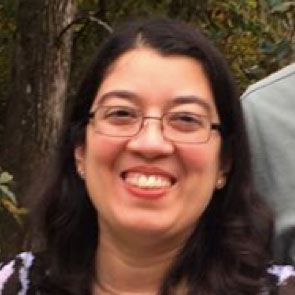
Tania Fleming has been our office manager since early 2011. This past fall, a group of faculty worked together to nominate her for one of UF’s Superior Accomplishment Awards. Tania works tirelessly on a daily basis to keep things running smoothly, to ensure everything that needs to happen does, and that what shouldn’t happen doesn’t. We would be lost without Tania at our help. And so we were thrilled to learn recently that she has been chosen to receive one of these prestigious awards. Congratulations, Tania, and thank you for all you do!